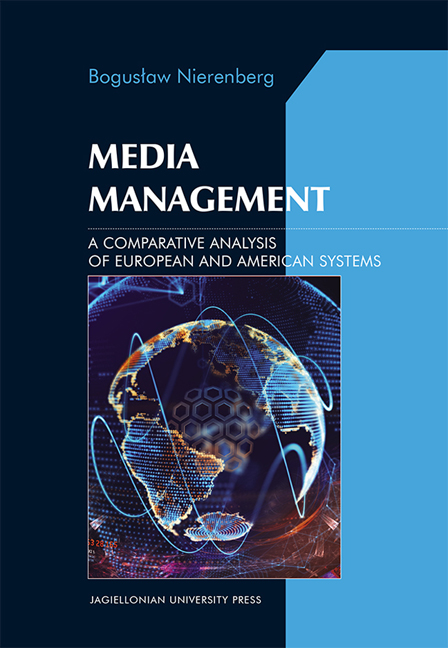Book contents
- Frontmatter
- Dedication
- Contents
- Introduction
- Epigraph
- Part 1
- Part 2
- Part 3
- Chapter 7 Managers and Journalists
- Chapter 8 Strategies of Media Organizations. Value for Consumers
- Chapter 9 Legal and Ethical Aspects of Media Management
- Chapter 10 Developmental Trends of Media Organizations. Indicators of the Future of the Media
- Summary
- Bibliography
- Lists of Tables, Figures and Charts
Chapter 9 - Legal and Ethical Aspects of Media Management
from Part 3
Published online by Cambridge University Press: 10 January 2018
- Frontmatter
- Dedication
- Contents
- Introduction
- Epigraph
- Part 1
- Part 2
- Part 3
- Chapter 7 Managers and Journalists
- Chapter 8 Strategies of Media Organizations. Value for Consumers
- Chapter 9 Legal and Ethical Aspects of Media Management
- Chapter 10 Developmental Trends of Media Organizations. Indicators of the Future of the Media
- Summary
- Bibliography
- Lists of Tables, Figures and Charts
Summary
Boundaries of media freedom
Media freedom is one of the pillars of a democratic country as it is connected with everyone's right to the freedom of speech. This right should be guaranteed. One of the first regulations of this type can be found in clause 12 of the Virginia Declaration of Rights of April 12, 1776: “That the freedom of the press is one of the great bulwarks of liberty, and can never be restrained but by despotic governments [Barta, Markiewicz, Matlak 2005: 15].”
Freedom of the media in the contemporary world is a key issue due to the fact that the mass media shape attitudes, views, and in a word, an image of the contemporary world in the minds of their customers. Will Rogers, one of the best-known American observers of public life of his times, used to begin his comments with the words: “I know only as much as in newspapers [Mallette 1996: 83].” D. Mc Quail [2007: 175] noticed that the “mass media not only wield some objective influence on society but are also used for social purposes.”
It can be assumed that the basic determinants of media freedom are of three types:
• legal and ethical
• socio-political
• economical.
The legal norm which ensures media freedom is the basis. However, this freedom would be just an empty slogan, provided there is no political will or the will of the ones in power to respect this freedom. The media cannot operate without resources that are essential for its functioning, without economic resources. Therefore, it appears that media freedom should be guaranteed in these three dimensions. A shortage of any of them will cause media freedom to become deformed or even non-existent. Also the journalists themselves, concerned about high standards and the freedom of the performed profession, invoke used deontological codes. It seems that a breakthrough in this scope was the Hutchins Commission Report of 1947, the aim of which was “to examine areas and circumstances under which the press of the United States is succeeding or failing; to discover where free expression is or is not limited, whether by government censorship pressure from readers or advertisers or the un wisdom of its proprietors or the timidity of its management [ibid.: 183].”
- Type
- Chapter
- Information
- Media ManagementA Comparative Analysis of European and American Systems, pp. 167 - 180Publisher: Jagiellonian University PressPrint publication year: 2016

